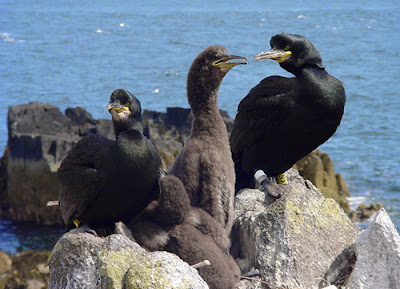 |
| Sefton coast sand dunes |
Seabirds have declined by 7.5% in the UK since the turn of the century, and climate warming is considered to be one of the main drivers by altering prey abundance and quality. Models predict that, by 2100, the UK climate will no longer be suitable for some species, with the range of others retracting to northern Scotland. Any increase in the frequency of extreme weather could further impact on seabirds by altering breeding habitat and creating unfavourable foraging conditions.
 |
| Seabirds on the Isle of May |
The scorecards are produced by the Marine Climate Change Impacts Partnership (MCCIP) and cover more than 30 marine and coastal topics. More than 150 scientists from 55 leading UK science organisations contributed to the 2013 report.
The scorecards are published annually, and provide latest updates on the evidence of recent change and best scientific projections of what is likely to happen in the near future. A summary of the findings for all UK marine and coastal habitats, and the detailed peer-reviewed briefings on all 33 topics can be found on the MCCIP website.
Additional information
The Marine Climate Change Impacts Partnership was launched in March 2005 and is a partnership between scientists, government, its agencies, non-governmental organisations and industry.
A press release was issued to announce publication of the 2013 Report Card.
Related CEH links
Staff page of Dr Laurence Jones (sand dune expert)
Staff page of Angus Garbutt (saltmarsh expert)
Staff page of Dr Francis Daunt (seabird expert)

No comments:
Post a Comment